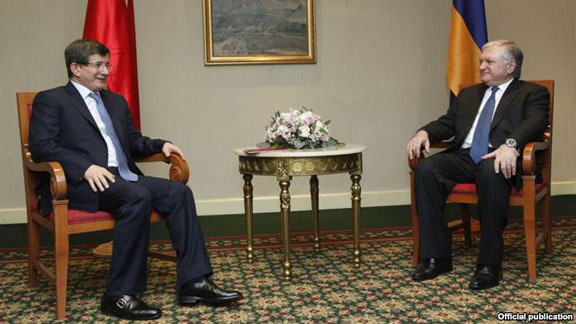Davutoglu: 1915 Armenian Deportations ‘Inhumane’
ISTANBUL—The “deportation” of Armenians in 1915 was inhumane, and Turkey has never supported the move, Foreign Minister Ahmet Davutoğlu said Thursday as visited Armenia, reported the Hurriyet Daily News.
Davutoglu was in Yerevan to attend a meeting of the Black Sea Economic Cooperation, on the sidelines of which he and Armenia’s Foreign Minsiter Eduard Nalbandian had an hour-long meeting.
“We are very pleased with the meeting with Nalbandian; it was candid. The primary aim is to build an environment of dialogue on a strong basis,” Davutoğlu said after the meeting, while dismissing claims that he suggested to Armenia that it withdraw from two regions in Nagorno-Karabakh.
Davutoğlu expressed his hope that a collective consciousness between the two countries could be created with what he called “just memory.”
“We say ‘just memory.’ What I mean with that we should know the facts. Then we see that Turkish-Armenian relations do not date back like German-Jewish ties. In every street, there is a common sign,” explained Davutoglu.
“After you discover this, then you see the deportation, which I see as a totally wrong practice done by [the Ottoman-era rulers under the Committee of Union and Progress]. It was inhumane,” Davutoglu told a group of reporters en route to Yerevan.
“But when you write history, taking the deportation into account, then a collective conscious was created from this side [Turkey] that Armenians betrayed their nation and deserved the deportation. We should destroy these two collective consciousnesses. We abolished this wrong consciousness in 2005, but Armenians still have it,” he told reporters.
“Our primary aim is not open only the Turkish-Armenian border but to form a foundation that will pave the way for a comprehensive peace,” added Davutoglu said.
“It has three pillars. The first one is relations between Turkey and Armenia. The second one is Azerbaijani-Armenian relations. This also includes Georgian-Abkhaz ties. The third one is relations between Turks and Armenians,” he said.
“If one of the pillars is crippled, it will create distress. Let’s say we opened the Armenian border gate. If a war breaks out between Armenia and Azerbaijan, then we would be forced to close it again. The hardest thing is to defrost the iceberg of the status quo. You could start a war when you trying to defrost it,” he said.
Davutoglu claimed that he has been meeting with members of the Armenian Diaspora during his travels to various countries, saying, however, that those meetings are not publicized “due to the fact that extremist Armenians would cause problems.
“In the past, talking with the diaspora has been perceived as a threat or aimed for intelligence issues. Diplomats thought, ‘What would I do?’ if it were recorded. But now it has become a duty. Since that time, whenever I go abroad I meet with the Armenian community if there is one,” announced Davutoglu, who explained that “What we realize is that if you cannot provide a basis in ties with the diaspora, that puts pressure on ties with Armenia and it becomes deadlocked.”

